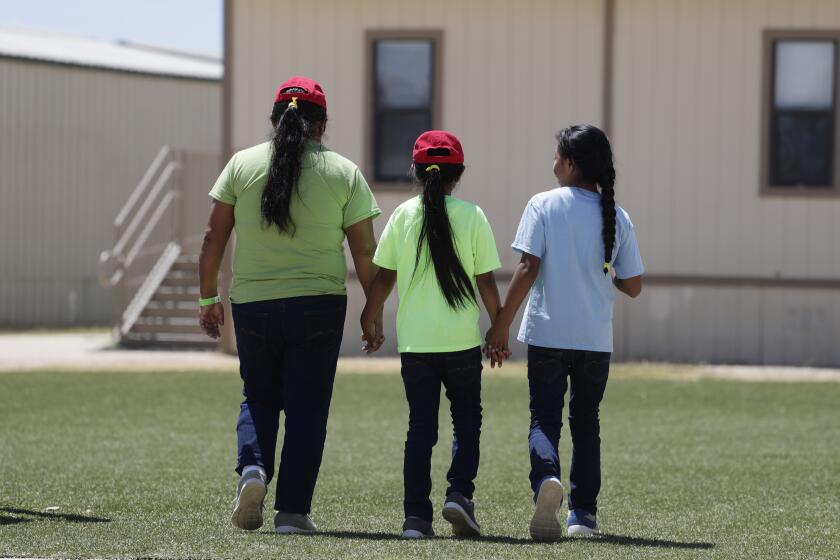Judge Rejects Drug Searches at Checkpoints : Civil Rights: Federal government’s bid to allow stops without probable cause is called unconstitutional.
- Share via
A U.S. District Court judge Friday rejected the federal government’s bid to give the U.S. Border Patrol authority to make drug searches “without a founded suspicion” at the two immigration checkpoints on major freeways leaving the San Diego area.
In a major victory for civil libertarians, Judge J. Lawrence Irving ruled that the government’s request to use the checkpoints for both immigration and drug-related stops of motorists would violate the Constitution, particularly Fourth Amendment protections against unreasonable search and seizure.
Defense attorneys opposing the government’s motion had argued that expanded narcotics jurisdiction at the checkpoints--in the northbound lanes of Interstate 5 near San Clemente and of Interstate 15 in southern Riverside County--could eventually give U. S. officials broad authority to set up drug checkpoints almost anywhere in the nation.
“Despite the gravity of the drug-trafficking problem and the brevity of the proposed stops,” Irving wrote in his 16-page decision, “this court cannot condone the evisceration of the Fourth Amendment by allowing permanent checkpoints to serve the ‘dual purpose’ of permitting Border Patrol officers to investigate both immigration and narcotics violations.”
The decision was applauded by Betty Wheeler, legal director of the American Civil Liberties Union of San Diego and Imperial Counties, who called the government’s request yet another example of the assault on individual rights associated with the anti-drug efforts.
“This is just one instance in many in which the perceived drug crisis has caused the government to seek exceptions to civil liberties requirements,” Wheeler said. “Our view is that it is precisely during times of perceived crisis that our civil liberties have to be upheld.”
William Braniff, U.S. attorney in San Diego, said prosecutors will probably continue to seek court approval for the drug stops, possibly at the appellate level. However, he noted that Irving’s decision will not be appealed, as the judge, in the same ruling, actually upheld the legality of two recent drug seizures at the checkpoints that resulted in criminal prosecutions.
Irving ruled that the Border Patrol had sufficient legal authority to conduct the searches that led to the seizures because the behavior of the motorists gave the agents reasonable cause to suspect that something was wrong.
“We feel our position is a correct one, and we look forward to being able to demonstrate that in the future, either to another judge or a higher court,” Braniff said.
The U.S. attorney general’s office in Washington had approved the prosecutor’s decision to seek authority to conduct drug stops at the checkpoints, Braniff said, although the idea originated in the U.S. attorney’s office in San Diego.
In court papers, federal prosecutors had argued that the increasing amounts of drugs entering via the U.S.-Mexico border required the dual-purpose role at the checkpoints, which were set up exclusively for immigration-related investigations. A 1976 Supreme Court ruling, U.S. vs. Martinez-Fuerte, upheld checkpoint stops of motorists for brief questioning regarding immigration status.
But the high court ruling made no mention of drug investigations. In the current case, the government had sought to extend the Supreme Court’s rationale to the narcotics arena, thereby enabling checkpoint agents to conduct narcotics stops without the “founded suspicion” of a violation that is now required.
“The problems associated with alien smuggling are clearly no more important than the scourge of drugs,” Assistant U.S. Atty. Patrick K. O’Toole argued in court papers.
As part of their application, federal prosecutors submitted statistics demonstrating what they characterized as the soaring volume of drug trafficking along the almost 2,000-mile-long U.S.-Mexico border, which has long been a smuggling corridor. Border seizures of cocaine increased from fewer than 60 kilograms in fiscal 1982 to almost 12,000 kilograms in fiscal 1989, while seizures of marijuana rose from about 27,000 kilograms to almost 200,000 kilograms during the same period, according to government figures filed in connection with the case.
But Judge Irving rejected the government’s argument, noting that the 1976 Supreme Court ruling permitted only immigration stops. Accepting the government’s argument, the judge said, would come “uncomfortably close” to rejecting the Supreme Court’s ruling in a Prohibition-era case, Carroll vs. U.S. (1924). In that instance, Irving noted, the court ruled that law enforcement officers needed some form of “probable cause” before stopping a vehicle, questioning its occupants and searching it for contraband. The “probable cause” threshold has since been upheld by numerous court rulings, and has become a bedrock principle in U.S. law enforcement to protect innocent citizens from harassment by police agencies.
More to Read
Sign up for Essential California
The most important California stories and recommendations in your inbox every morning.
You may occasionally receive promotional content from the Los Angeles Times.









